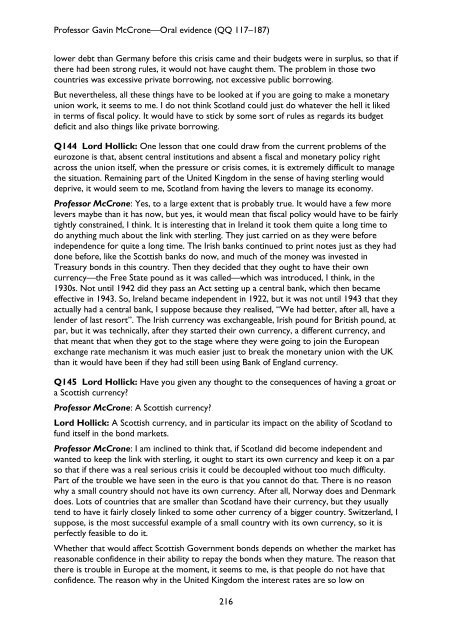SELECT COMMITTEE ON ECONOMIC AFFAIRS - Parliament
SELECT COMMITTEE ON ECONOMIC AFFAIRS - Parliament
SELECT COMMITTEE ON ECONOMIC AFFAIRS - Parliament
You also want an ePaper? Increase the reach of your titles
YUMPU automatically turns print PDFs into web optimized ePapers that Google loves.
Professor Gavin McCrone—Oral evidence (QQ 117–187)<br />
lower debt than Germany before this crisis came and their budgets were in surplus, so that if<br />
there had been strong rules, it would not have caught them. The problem in those two<br />
countries was excessive private borrowing, not excessive public borrowing.<br />
But nevertheless, all these things have to be looked at if you are going to make a monetary<br />
union work, it seems to me. I do not think Scotland could just do whatever the hell it liked<br />
in terms of fiscal policy. It would have to stick by some sort of rules as regards its budget<br />
deficit and also things like private borrowing.<br />
Q144 Lord Hollick: One lesson that one could draw from the current problems of the<br />
eurozone is that, absent central institutions and absent a fiscal and monetary policy right<br />
across the union itself, when the pressure or crisis comes, it is extremely difficult to manage<br />
the situation. Remaining part of the United Kingdom in the sense of having sterling would<br />
deprive, it would seem to me, Scotland from having the levers to manage its economy.<br />
Professor McCrone: Yes, to a large extent that is probably true. It would have a few more<br />
levers maybe than it has now, but yes, it would mean that fiscal policy would have to be fairly<br />
tightly constrained, I think. It is interesting that in Ireland it took them quite a long time to<br />
do anything much about the link with sterling. They just carried on as they were before<br />
independence for quite a long time. The Irish banks continued to print notes just as they had<br />
done before, like the Scottish banks do now, and much of the money was invested in<br />
Treasury bonds in this country. Then they decided that they ought to have their own<br />
currency—the Free State pound as it was called—which was introduced, I think, in the<br />
1930s. Not until 1942 did they pass an Act setting up a central bank, which then became<br />
effective in 1943. So, Ireland became independent in 1922, but it was not until 1943 that they<br />
actually had a central bank, I suppose because they realised, “We had better, after all, have a<br />
lender of last resort”. The Irish currency was exchangeable, Irish pound for British pound, at<br />
par, but it was technically, after they started their own currency, a different currency, and<br />
that meant that when they got to the stage where they were going to join the European<br />
exchange rate mechanism it was much easier just to break the monetary union with the UK<br />
than it would have been if they had still been using Bank of England currency.<br />
Q145 Lord Hollick: Have you given any thought to the consequences of having a groat or<br />
a Scottish currency?<br />
Professor McCrone: A Scottish currency?<br />
Lord Hollick: A Scottish currency, and in particular its impact on the ability of Scotland to<br />
fund itself in the bond markets.<br />
Professor McCrone: I am inclined to think that, if Scotland did become independent and<br />
wanted to keep the link with sterling, it ought to start its own currency and keep it on a par<br />
so that if there was a real serious crisis it could be decoupled without too much difficulty.<br />
Part of the trouble we have seen in the euro is that you cannot do that. There is no reason<br />
why a small country should not have its own currency. After all, Norway does and Denmark<br />
does. Lots of countries that are smaller than Scotland have their currency, but they usually<br />
tend to have it fairly closely linked to some other currency of a bigger country. Switzerland, I<br />
suppose, is the most successful example of a small country with its own currency, so it is<br />
perfectly feasible to do it.<br />
Whether that would affect Scottish Government bonds depends on whether the market has<br />
reasonable confidence in their ability to repay the bonds when they mature. The reason that<br />
there is trouble in Europe at the moment, it seems to me, is that people do not have that<br />
confidence. The reason why in the United Kingdom the interest rates are so low on<br />
216

















